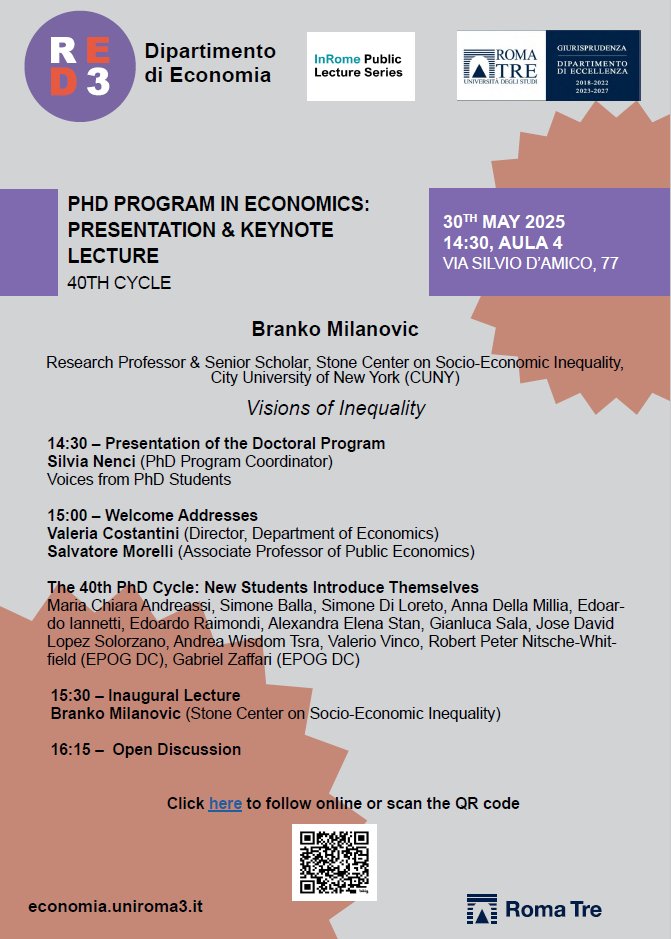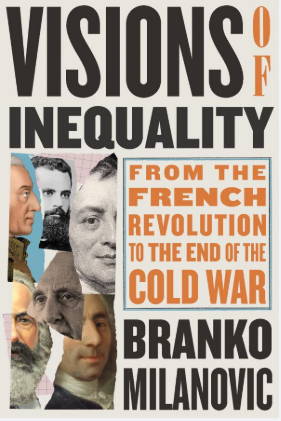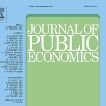
Marco Ranaldi
@marcoranaldi_
Assistant Professor in Economics @UCL and Director @cnetucl
Bsky: marcoranaldi.bsky.social
ID: 3151926714
http://mranaldi.com 12-04-2015 22:41:32
1,1K Tweet
2,2K Followers
476 Following


📢 Join us for the 10th London Inequality Workshop! 🗓Thursday, 20 March ⏰16:30 - 18:30 GMT 📍UCL School of Slavonic & East European Studies,Masaryk Room 🎤Presenters: 🔹 Daniele Girardi & Roberto Veneziani 🔹 Elena Casanovas Navarro 🔹 Joao Pereira dos Santos Free register here👉eventbrite.co.uk/e/10th-london-…

How should we think about the real limits to government spending for the times ahead?🏛️💸 `The General Relativity of Fiscal Space', our article with Jacob Assa attempts an answer. Open Access Review of Political Economy: tandfonline.com/doi/full/10.10… Data & Appendix: marc-morgan.eu/fiscal-space



What are the Trends in Inheritance Across Major Developed Economies? Why is this important & What are the major drivers? Why has the Progressivity of inheritance tax been declining globally? I have talked about these issues in the Economist (The Economist) podcast "Money Talks".


Distributional varieties of capitalism through the conceptualization and measurement of compositional inequality. What do we know, and what’s next? New open-access paper out now in Review of Political Economy👇 Link: shorturl.at/WDT20


New paper out =) Echo chambers, confirmed. Most of the top 1%'s income comes from capital, not labour World Inequality Lab | WID.world . When people learn this, attitudes towards the rich shift, especially among left-wing voters with egalitarian views.


After an intense day of strike, back to work! Today earlier than usually - already on my way to EH-Valencia to present joint work with Edoardo Rappa

🔔 | May 30, 3:30 pm – Roma Tre We are very pleased to host the keynote lecture Visions of Inequality by Branko Milanovic (Branko Milanovic Stone Center on Socio-Economic Inequality ) for the inaugural event of the 40th cycle of the PhD in Economics Economia Roma Tre Giurisprudenza Roma Tre . #InRome Public Lecture series



⬇️ Tomorrow (May 30: 2:30 pm) join us in Rome! with Branko Milanovic Economia Roma Tre Giurisprudenza Roma Tre sites.google.com/view/inequalit… #PhDEcon





Junto con Gustavo Marrero, Juan C. Palomino y Dmitry Petrov, lanzamos hoy este nuevo proyecto en el que medimos por primera vez la desigualdad de la riqueza regional en España, en colaboración con World Inequality Lab | WID.world y EsadeEcPol. Todos los resultados están spainwealthatlas.world!

My fun conversation with Paul Krugman about "the elephant", US inequality, global inequality, Adam Smith, Kuznets, Pareto...and even Marx paulkrugman.substack.com/p/global-inequ…

Just published in Journal of Public Economics: "The Influence of Inheritances on Wealth Inequality in Rich Countries" By Salvatore Morelli, Brian Nolan, Juan C. Palomino, & Philippe Van Kerm sciencedirect.com/science/articl… #econtwitter #publicfinance






